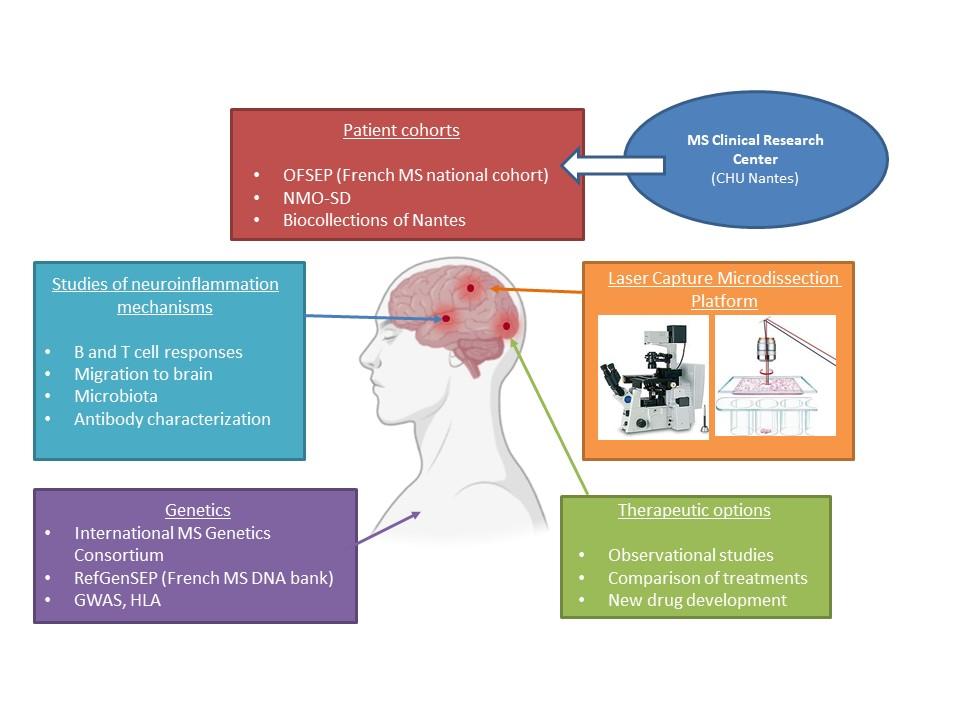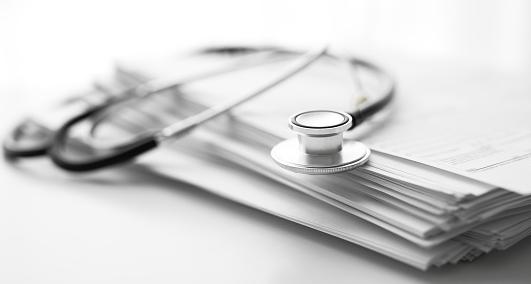Team 5 : Neuroinflammation, mechanisms, therapeutic options (NEMO)
Team 5 leaders: Pr. David Laplaud & Dr. Laureline Berthelot
Team 5 focuses on the immune mechanisms underlying autoimmune demyelinating diseases of the central nervous system, studying the pathophysiology and treatment of multiple sclerosis (MS) and neuromyelitis optica spectrum disorder (NMOSD). Our current research program aims at improving MS management, deciphering the immunopthology of MS linked to genetics. The developed research makes use of national biobanks (OFSEP) and collaborations with reputed national and international laboratories (IMSGC).
We particularly focus our fundamental research on CD8+ T cells and B cells in MS pathology, deciphering which subpopulations are involved and how they can be specifically targeted. In our research program, studies on antibody specificity linked to microbiota dysbiosis are developed. We also study the role of glial cell and antigen reactivity. Translational, genetic and clinical studies on MS and NMO complete the NEMO panel of research. We have access to and exhaustive biobank of MS patient samples (serum, saliva, LCS, stools, colon and brain sections, DNA collection: RefGenSEP). Animal models of MS (mice and rats) are also used to decipher pathological mechanisms and to test potential treatment as proof of concept.


Research program
Team 5 focuses on the immune mechanisms underlying autoimmune demyelinating diseases of the central nervous system, studying the pathophysiology and treatment of multiple sclerosis (MS) and neuromyelitis optica spectrum disorder (NMOSD). Our current research program aims at improving MS management, deciphering the immunopthology of MS linked to genetics. The developed research makes use of national biobanks (OFSEP) and collaborations with reputed national and international laboratories (IMSGC).We particularly focus our fundamental research on CD8+ T cells and B cells in MS pathology, deciphering which subpopulations are involved and how they can be specifically targeted. In our research program, studies on antibody specificity linked to microbiota dysbiosis are developed. We also study the role of glial cell and antigen reactivity. Translational, genetic and clinical studies on MS and NMO complete the NEMO panel of research. We have access to and exhaustive biobank of MS patient samples (serum, saliva, LCS, stools, colon and brain sections, DNA collection: RefGenSEP). Animal models of MS (mice and rats) are also used to decipher pathological mechanisms and to test potential treatment as proof of concept.

Clinicians / Associate Researchers
Research assistants
Postdoctoral fellows
PhD students
Selected publications
 Aglycosylated extracellular loop of inwardly rectifying potassium channel 4.1 (KCNJ10) provides a target for autoimmune neuroinflammation. Brain Commun. 2023 Feb 22;5(2):fcad044. PMID: 36910419
Aglycosylated extracellular loop of inwardly rectifying potassium channel 4.1 (KCNJ10) provides a target for autoimmune neuroinflammation. Brain Commun. 2023 Feb 22;5(2):fcad044. PMID: 36910419Immune profiling reveals the T-cell effect of Ocrelizumab in early relapsing-remitting multiple sclerosis. Neurol Neuroimmunol Neuroinflamm. 2023 Feb 21;10(3):e200091. PMID: 36810163
Multiple sclerosis CSF is enriched with follicular T cells displaying a Th1/Eomes signature. Neurol Neuroimmunol Neuroinflamm. 2022 Oct 20;9(6):e200033. PMID: 36266053
Patients with severe multiple sclerosis exhibit functionally altered CD8+ regulatory cells. Neurol Neuroimmunol Neuroinflamm. 2022 Oct 20;9(6):e200016. PMID: 36266052
The interaction between HLA-DRB1 and smoking in Parkinson's disease revisited. Mov Disord. 2022 Sep;37(9):1929-1937. PMID: 35810454
Gut bacteria Akkermansia elicit a specific IgG response in CSF of patients with MS. Neurol Neuroimmunol Neuroinflamm. 2020 May;7(3):e688. PMID: 32123045
Mis à jour le 29 octobre 2024.










